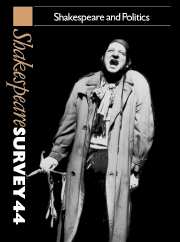Book contents
- Frontmatter
- Shakespeare and Politics
- Language, Politics, and Poverty in Shakespearian Drama
- Some Versions of Coup d’état, Rebellion and Revolution
- Woman, Language, and History in The Rape of Lucrece
- Love in Venice
- Two Kingdoms for Half-a-Crown
- ‘Fashion it thus’: Julius Caesar and the Politics of Theatrical Representation
- ’Demystifying the Mystery of State’: King Lear and the World Upside Down
- Tragedy, King Lear, and the Politics of the Heart
- The Politics of Shakespeare Production
- Shakespeare in the Trenches
- Shakespeare’s Earliest Editor, Ralph Crane
- Shakespeare’s Falconry
- Telling the Story of Shakespeare’s Playhouse World
- Shakespeare Performances in England, 1989–90
- Professional Shakespeare Productions in the British Isles January-December 1989
- Critical Studies
- Shakespeare’s Life, Times, and Stage
- Editions and Textual Studies
- Books Received
- Index
Critical Studies
Published online by Cambridge University Press: 28 March 2007
- Frontmatter
- Shakespeare and Politics
- Language, Politics, and Poverty in Shakespearian Drama
- Some Versions of Coup d’état, Rebellion and Revolution
- Woman, Language, and History in The Rape of Lucrece
- Love in Venice
- Two Kingdoms for Half-a-Crown
- ‘Fashion it thus’: Julius Caesar and the Politics of Theatrical Representation
- ’Demystifying the Mystery of State’: King Lear and the World Upside Down
- Tragedy, King Lear, and the Politics of the Heart
- The Politics of Shakespeare Production
- Shakespeare in the Trenches
- Shakespeare’s Earliest Editor, Ralph Crane
- Shakespeare’s Falconry
- Telling the Story of Shakespeare’s Playhouse World
- Shakespeare Performances in England, 1989–90
- Professional Shakespeare Productions in the British Isles January-December 1989
- Critical Studies
- Shakespeare’s Life, Times, and Stage
- Editions and Textual Studies
- Books Received
- Index
Summary
SHAKESPEARE'S RECEPTION
It is arguable that the most original research at the moment is devoted not to the plays themselves but to the ways in which Shakespeare's works have been received and used in different cultural contexts.
The cover of Michael D. Bristol's Shakespeare's America, America's Shakespeare (London, Routledge, 1990) is truly ghastly, and would fit more aptly on a hamburger stall than on a scholarly book. This may even be the intention, but is a pity, because the content is significant. Bristol ambitiously takes on the whole field of the reception of Shakespeare into American culture, and his thesis is that this reception has been largely a conservative one that has paradoxically overturned the spirit of the American revolution by allying itself closely with English, traditional assumptions. The hidden political agenda of both 'Institutional Infrastructure' (the Folger Library, tradition, the primacy of editing, the reputation- making function of much criticism) and of particular critics along the way has, Bristol argues, been deeply and uncritically reactionary. He cleverly chooses quotations from some venerated names such as Emerson, Lovejoy, Kittredge, Spencer, Craig, and Mack (whose essay appeared in a journal beside an article supporting America's role in Vietnam) to demonstrate their basic social interests which are patrician, paternalistic, white, male and conservative. Even some who would think of themselves as radical come under the lash. The textual 'revisionists' of the last few years are seen as fundamentally allied with their predecessors in still wanting stable texts (just more of them). Stanley Cavell reads from a stance of 'civil privatism' (p. 196) as if individualistic sensibility is threatened by community values, Richard Levin returns us to discredited notions of 'established meanings' and 'consensus' in his struggle against subversive pluralism.
- Type
- Chapter
- Information
- Shakespeare Survey , pp. 205 - 224Publisher: Cambridge University PressPrint publication year: 1991

